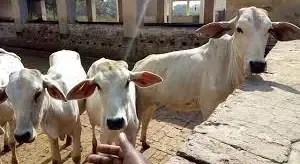Cabinet Greenlights Initiative to Combat Livestock Diseases with Rs.3,880 Crore Investment

Synopsis
Key Takeaways
- Investment: Rs.3,880 crore over two years.
- Components: NADCP and Pashu Aushadhi.
- Focus: Prevent livestock diseases and boost productivity.
- Sub-components: CADCP, ESVHD-MVU, and ASCAD.
- Goal: Enhance access to veterinary medicines.
New Delhi, March 5 (NationPress) The Union Cabinet, led by Prime Minister Narendra Modi, on Wednesday sanctioned a revised version of the Livestock Health and Disease Control Programme (LHDCP) with a substantial budget of Rs.3,880 crore.
This initiative is composed of two main elements: the National Animal Disease Control Programme (NADCP) and the newly included Pashu Aushadhi.
According to the Cabinet's announcement, “LHDCP encompasses three sub-components: the Critical Animal Disease Control Programme (CADCP), the Establishment and Strengthening of existing Veterinary Hospitals and Dispensaries - Mobile Veterinary Unit (ESVHD-MVU), and the Assistance to States for Control of Animal Diseases (ASCAD). The addition of Pashu Aushadhi marks a significant enhancement to the LHDCP scheme.”
“The total investment for this scheme amounts to Rs.3,880 crore over the two-year period of 2024-25 and 2025-26, inclusive of Rs.75 crore earmarked for providing high-quality and affordable generic veterinary medicine, alongside incentives for the distribution of medicines through the Pashu Aushadhi initiative,” it further stated.
The scheme is designed to enhance livestock productivity, which has been negatively affected by diseases such as foot and mouth disease (FMD), brucellosis, peste des petits ruminants (PPR), cerebrospinal fluid (CSF), and lumpy skin disease, among others.
“The execution of the LHDCP is anticipated to significantly curtail these losses by preventing diseases through comprehensive immunization,” the Cabinet remarked.
Additionally, the scheme promotes the provision of livestock healthcare directly to farmers via mobile veterinary units (ESVHD-MVU) and aims to enhance the accessibility of generic veterinary medicines through a network of PM-Kisan Samriddhi Kendras and cooperative societies.
It will “aid in the prevention and management of livestock diseases through vaccination, monitoring, and the improvement of healthcare facilities,” stated the Cabinet.
Moreover, the initiative is expected to boost productivity, create job opportunities, foster entrepreneurship in rural areas, and mitigate economic losses for farmers stemming from disease-related challenges.










